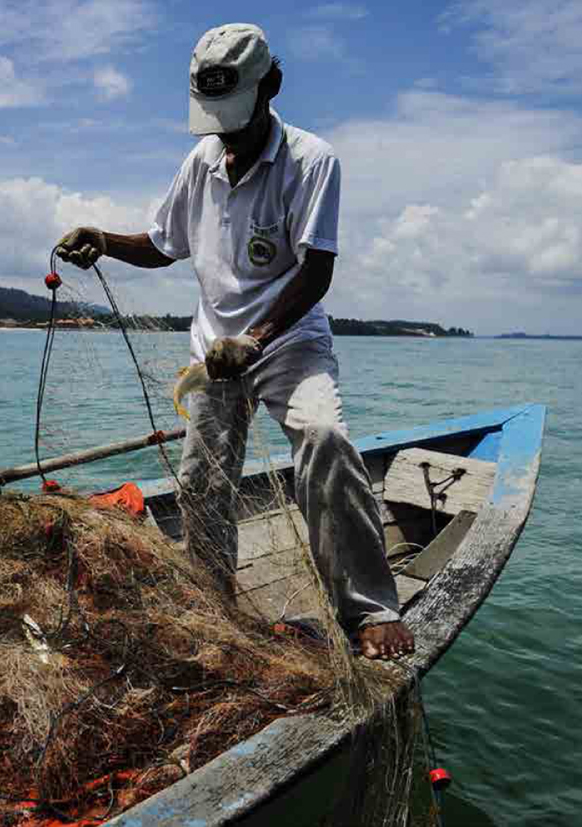
I HEAR THEM before I open my eyes. Elephant cicadas. Frogs. Owls. The birds called nightjars are still performing their nocturnal hymns. A myriad of voices take turns in the choir of the dark Borneo rainforest. Many are by now familiar, but others truly challenge the imagination. Some are melodic and beautiful, others funky and industrial, as if from a weird science fiction movie.
It’s still really dark when I pull aside the tent flap and walk down the path to one of my tree blinds. I’m careful not to scare the orangutan mother and baby sleeping in their night nest up in a tree a thousand feet away. When I arrive at the giant dipterocarp tree, I put on my harness, lock into my climbing gear, and start making my way up the huge trunk. I still can’t see anything except fireflies flicking through the humid air. I share the climbing rope this morning with a whole family of ants using this perfectly straight route instead of vines and lianas.
At the top, where the rope is attached to a large branch, I gently climb onto the wooden platform perched 56 m (185 ft) off the ground. My blind, covered with camouflage net and green tarp, is located opposite a fruiting giant fig tree. My hope is to get more photographs of orangutans, gibbons, hornbills, and giant squirrels. As I look through the net, the sky appears slightly lighter but I can still barely make out the leaden gray clouds flitting by.
In a few moments, the gibbons should start their bubbling calls to one another from the opposite ridge, and the argus pheasants should add their loud voices to the choir, as they’ve done since time immemorial. Their hooting calls, in fact, signal a healthy ecosystem. The pheasants are an important indicator species. Their presence means the forest is in good shape. When a forest is fragmented by logging, the trees become stressed and stop producing fruit or seeds. This destabilizes a system that many species depend on, and the birds disappear. A forest without the argus is a system destabilized.
I was 20 years old the first time I came to Borneo. I remember walking among the giant trees feeling as if I’d entered a cathedral. That was back in 1988. Since then I’ve returned 30 or 40 times, working on magazine articles, books, and documentary films. To me, this is a place of small miracles, brimming with life. No matter where you look, you see something amazing. The whip snake is one of my favorites. When it stalks a lizard in a tree, it sways gently back and forth, imitating the movement of a wind-struck liana. So beautiful.
But Borneo has changed. A lot of the island doesn’t look like it used to. Much of the rainforest is gone—perhaps 75 percent—leveled to make way for plantations of palm oil trees or other crops. Even places that were supposed to be off limits have been destroyed. In some national forests, as many as 30 percent of the trees have been illegally logged—as a result of corruption.
Why should we care if we lose another rainforest? Why should we care about the orangutans or gibbons? Aren’t there more important things to worry about? In a world with more than seven billion people, something has to be sacrificed, doesn’t it? Why not Borneo?
This is something to ponder. After all the years I’ve spent working in remote and relatively pristine areas, one thing has become clear: Wild places like the Borneo rainforest are as essential to the health of faraway places like Tokyo or Chicago as the lungs in a body are to its muscles. Cities, societies, and nations depend on healthy natural ecosystems to survive and prosper. They’re interconnected and interdependent.
In the chapters in this section, we’ll explore this idea further, showing how sustainable use of resources, ecosystems, and the climate can help build economies. Business-as-usual isn’t enough any more to deliver growth, wellbeing, or happiness. We’re going to need a burst of innovative technologies, improvements in efficiency, and sustainable “circular” economies to reach our goals. We’re going to have to become stewards of the remaining beauty on our planet.
Sitting up here in my tree platform, surrounded by this ancient forest, I feel small. But I also take strength from it. Borneo is one of the places that have charged my heart with passion for our natural realms. The natural world, as we know it, is not something we can choose to have or to lose. It’s something we need for our survival. — Mattias Klum
As huge fleets vacuum up fish along many coastlines, fishermen like this one in Sarawak, Malaysia, have a tough time catching enough fish.